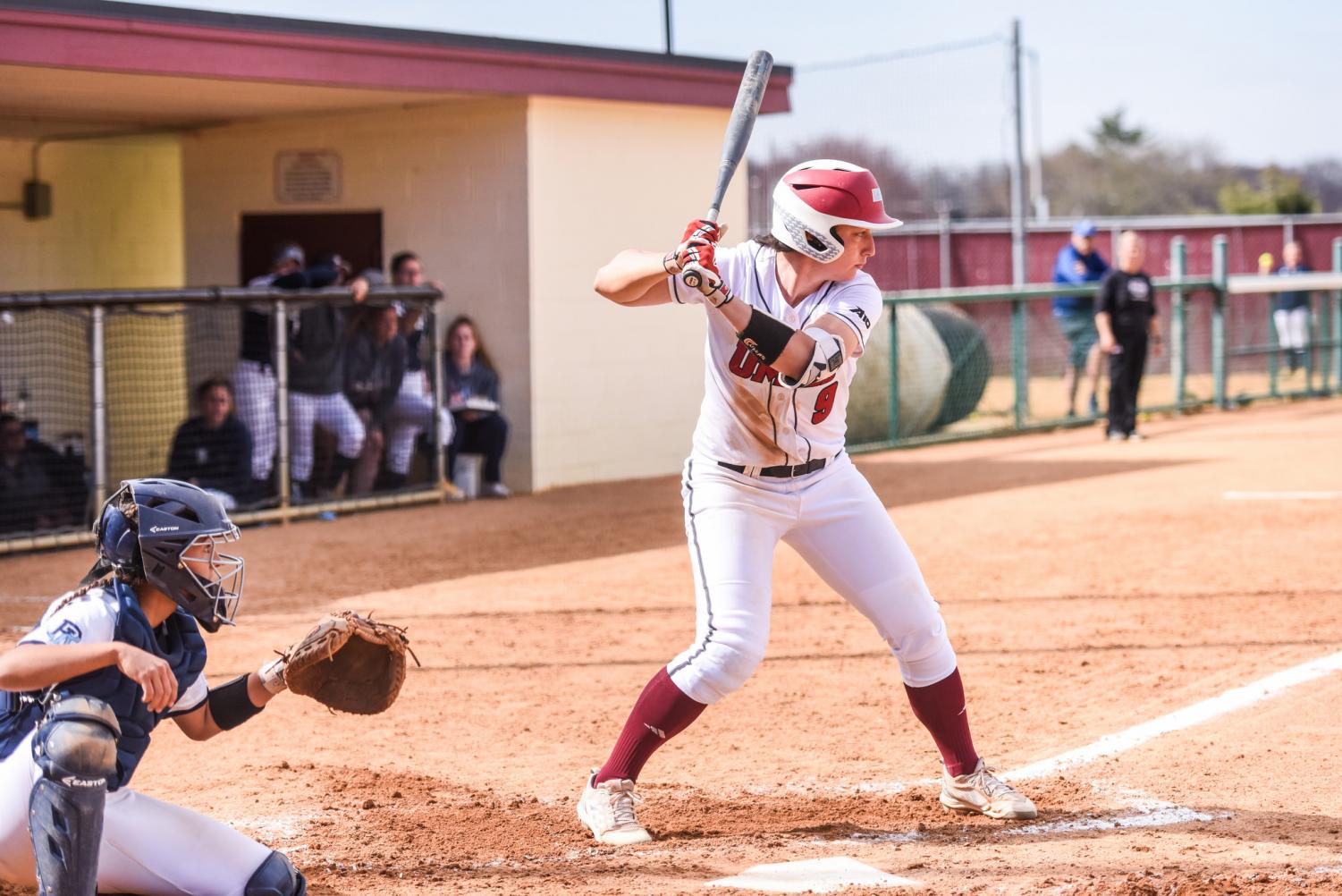The endless perseverance and overwhelming dominance of Jena Cozza
The senior ranks nationally in multiple offensive categories
May 1, 2018
Watching Jena Cozza take batting practice is an experience.
She’s an imposing figure at the plate, rhythmically rocking back and forth as she waves her bat over the plate and back toward her shoulders, the fingers on her right hand leaving the bat each time it moves away from her body.
It’s a loose, easy swing—effortless, almost—but the ball explodes off of her bat. She’ll put pitch after pitch out into the stands, and things start to get silly after she’s hit four or five balls in a row completely out of Sortino Field.
“Every now and then it gets a chuckle out of me,” says coach Kristi Stefanoni. “Who does this, all the time like this? It’s consecutive, not just one pitch or two pitches. If we’re throwing regular [batting practice], it’s all five pitches that she gets that goes out of the complex.”
At practice the day before the Massachusetts softball team is set to host Rhode Island for a Tuesday doubleheader, Cozza gets a pitch way in on the hands from pitching coach Chelsea Plimpton, and she gets almost no extension with her arms, forced to just try short-arm it and fight it off. Fight it off she does—over the scoreboard in left field.
After she deposits one final pitch into the parking lot beyond Sortino Field, Cozza walks over to hitting coach Ronnie Gajownik, undoing her batting gloves as outfielder Erin Stacevicz digs in her for own cuts.
“I don’t even know how that one went out,” she says. “My arms were like all in here.”
No one else really knows how she does these things, either.
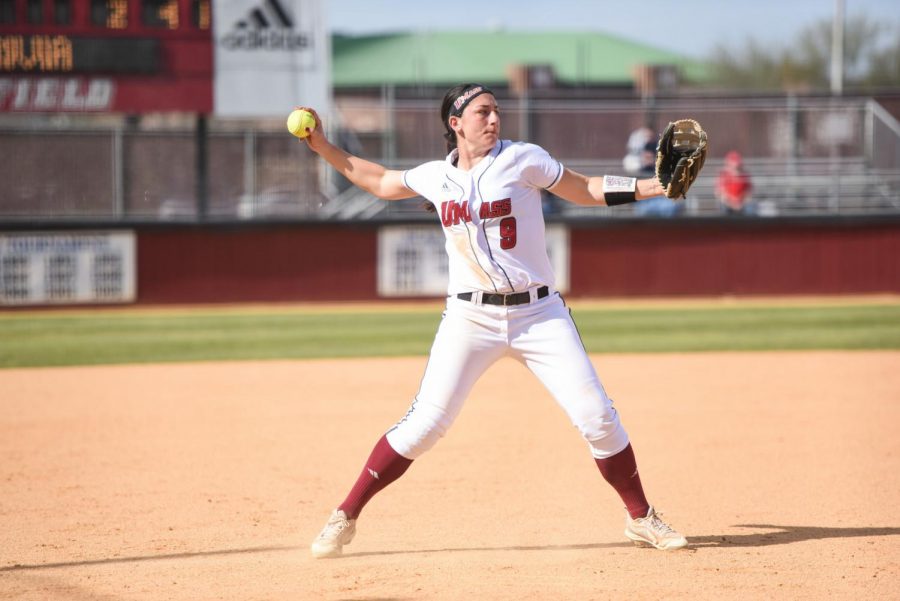
Cozza’s initially quiet—Stefanoni says it took her “two years to get Jena to speak.” She loves Disney movies and puzzles, but not homework, never homework. Her academic aversion is well documented: “I’m not really a big school person,” Cozza says.
Junior Kaycee Carbone is a little more direct about it: “Jena hates homework. She really hates school.”
A native Long Islander, Cozza’s accent comes out with certain words—“ask” sounds like “axe,” and words like “talk” and “ball” and “thought” are drawn out to two syllables, with an unmistakable New York twist.
Stefanoni claims her star third baseman is a great dancer, but all Cozza will concede is that “I have rhythm, I’ll say that.”
She’s developed as a leader off the field and in the locker room, and both Carbone and senior Meg Colleran summed her up in exactly the same words: “She’s a lot of fun.”
For her friends, she’s fun; for opposing pitchers, she’s anything but. In her final season at UMass, Cozza is putting on an offensive show for the program record books.
The numbers really speak for themselves: Cozza is hitting .488 with a .640 on-base percentage and a .992 slugging percentage, with 15 homers and 50 RBIs to her credit in 43 games this season.
She leads the Atlantic 10 in batting average by 97 points; second-place Jenna Cone is nearly 170 points back in the on-base column, while Saint Louis’ Sadie Wise trails Cozza by 232 points on the slugging leaderboards.
She’s third in the nation in batting average—she led the NCAA at one point this season—and slugging percentage, and has the second-highest on-base percentage of any hitter in the country.
Cozza’s probably the frontrunner for A-10 Player of the Year at this point, and none of the Minutewomen are particularly surprised. It isn’t all that wild an idea for someone that Colleran calls an “insane athlete.”
Colleran is Cozza’s lifting partner when the Minutewomen are in the weight room, and Cozza “can put up 70, 80 more pounds than me on every single lift, I’m just struggling to keep up.”
Stefanoni calls Cozza “a student of the game,” the sort of player that Stefanoni’s coach, the late Elaine Sortino, would always tell her players to be.
“She’s always looking for ways to get better,” Stefanoni says. “She’s come in and picked my brain as a coach, she’s gone into our assistants’ office and done the same exact thing, she’s always just wanting to talk the game out and talk it through, and that’s what make her different.”
Cozza is far from one-dimensional—she’s the best defensive player the Minutewomen have, a slick-fielding third baseman with a cannon for a right arm. Cozza made multiple highlight-reel plays in last year’s A-10 title game, charging high choppers and uncorking darts across the diamond time and time again, prompting Stefanoni to mention that she actually recruited Cozza for her defense in the first place.
“The first thing that caught my eye with her was her defense,” says Stefanoni. “She played like a baseball player. She just had real smooth hands, she was quick, she got rid of the ball well.
“When I started recruiting Jena, she was little, if you can imagine it.”
It’s odd to imagine that a slugger like Cozza was a little left-handed slapper just trying to leg out some weak grounders, but that was the player Stefanoni found years ago. She knew the defense would come along—the tape-measure homers, not so much.
“If someone had asked me then if she would be as great a hitter as she is now, I would’ve had no idea,” Stefanoni says. “But defensively? I would have said that kid is going to be an amazing defensive player, and she has been. I didn’t know the total package that we were getting.”
Cozza prefers playing defense anyway. She claims she’s been unhappy with her defensive performance this season, and she’s focused more on fixing her occasional errors than her stat line.
“I just like playing defense,” she says. “I like being on the field. It’s a lot more exciting for me to make a diving play than to hit a home run. I take a lot of pride in it.”
Still, it’s the production at the plate that’s been turning heads all season.
Plenty of stats can sum up Cozza’s brilliant season, but the most jarring number of all isn’t really a positive one. She still leads the nation in one category, as teams find a different way to avoid her—nobody in the NCAA has been hit by more pitches on a per-game basis.
And the beanings wouldn’t be so problematic, if not for a pair of catastrophic knee injuries that have already derailed promising seasons before.
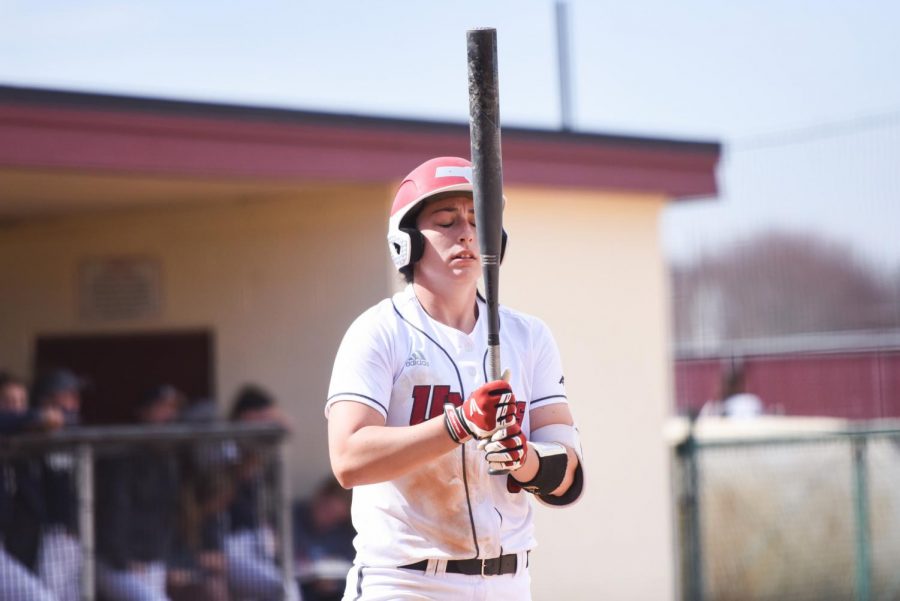
Cozza digs in against Saint Joseph’s, already frustrated.
It’s the third game of a weekend set in early April, and Cozza has already been hit three times in the series, each one from the right hand of Hawks junior Ashley Ventura.
“That weekend, I was actually angry,” Cozza says, “I never felt like people were throwing at me, except for that weekend. Just because nobody was getting hit, and she had no trouble going inside on anybody else.”
Ventura’s first pitch is well inside, and Cozza jumps out of the way. She calmly goes through her between-pitches routine, taking two uppercut practice swings that crack the back of her heel on her backswing, and adjusts her batting gloves—“the batting gloves have to be tight,” she says—before she gets back into the box.
There’s no escaping the second one. Ventura’s next delivery drills Cozza on the inside of her right knee. She doesn’t say a word—she just slowly goes to the dirt, holding her knee.
“The third one I actually got annoyed and spiked my bat, but the fourth one really hurt, and I just went to the ground,” Cozza says. “But I heard everyone yelling, so there really wasn’t anything for me to say.
“That one hurt pretty bad.”
The Minutewomen are irate, as Ventura isn’t so much as given a warning. Stefanoni is yelling from the third base coaching box, the dugout is livid and Stacevicz is wandering out from the on-deck circle, screaming at Ventura and the umpires with equal vitriol.
Cozza jokes that Stacevicz is the only one who might be liable to do anything.
“I would probably go with Erin,” Stefanoni says with a laugh. “Hopefully none of them ever do it, or you will never see a human run as fast as me to get them.”
The UMass crowd is just as angry but the game goes on, as Cozza limps to the dugout.
She comes out to take grounders before the top of the fifth, but Stefanoni decides to play it safe and pull her superstar from the game as a precaution.
Carbone was incensed post-game: “We get so mad when Jena gets hit,” she said. “It’s frustrating because she’s such a good player, but if you’re going to put her on base, intentionally walk her. You don’t have to hit her. She has two bad knees already. There’s no point in injuring her more. It’s just disrespectful and poor sportsmanship.”
When the subject comes up weeks later, Carbone just sighs and says, “Oh, sweet lord.”
To put UMass’ frustration in perspective, by the time that series wrapped, Ventura had hit six batters all season, four of which were Jena Cozza.
To try and combat that tactic, Stefanoni has been hitting Cozza leadoff all season, a major departure from common softball and baseball strategy that puts your best hitter second, third or fourth, where they can drive in as many runs as possible. As far as Stefanoni’s concerned, if you want to walk her leadoff hitter and start every game with a baserunner, go right ahead.
But it isn’t just that the bat is being taken out of her hands, though Stefanoni and Carbone have both mentioned the frustration of wanting “so badly” to see her hit the ball; the infinitely bigger problem is the damage it’s doing to Cozza’s body.
It takes Cozza some time to list everything.
“ACL and meniscus on both. So the right one was first, I did that sophomore year. That one, I tore ACL, meniscus and my MCL, I did all three,” Cozza says. “But they do the surgery all together, so on my right, the ACL was repaired with a patellar tendon graft, and they just snipped my meniscus, they just cut it out.
“On my left one, they originally thought it was just ACL, but when they went inside, they found that I actually did tear my meniscus, so they repaired that and just fixed the ACL with another patellar tendon,” she says.
Throw in a calcifying bruise on her thigh that needs treatment and protection too, and she’s got as much padding on her lower body as a hockey goalie.
It all started sophomore year. Cozza was looking to build off an A-10 Rookie of the Year season the year before, as UMass headed to Houston for its first preseason tournament of the spring.
Junior Kaitlyn Stavinoha, a Houston native and then a senior in high school, came to see her future team open its 2015 season. She missed the opener, and by the time she made her way into the stands for the second game, Cozza’s sophomore season was already over.
In the first game of the year, Cozza was playing second and a groundball up the middle hit shortstop Quianna Diaz-Patterson’s arm and popped to Cozza, who barehanded it as she stepped on second base. Cozza believes an unfamiliar new pair of metal cleats were the culprit, as she “just got stuck in the ground. I felt my body rotate, and my leg didn’t move. I just heard a crack, and then I hit the floor.”
She took a medical redshirt and came back for her redshirt sophomore season in 2016, hitting .400 and slugging .706 en route to an All-Conference First Team selection and an All-Region nod. But later that year, as UMass played its usual slate of fall games, her other knee gave on her too.
She was at shortstop this time, and a little blooper over the pitcher hit the turf and spun away from her, and as she went to go with it, she felt her leg go, and this time she knew.
“This one actually felt disgusting, it felt like my knee made an ‘L’ [shape],” Cozza says, “and I knew as soon as I did this one that I blew it out.
“As soon as I got into the dugout, someone asked me if I was going to come back, and I said, ‘I have to.’”
Cozza missed the first 29 games of 2017 but decided to play the second half of the season instead of taking another redshirt and adding another year—she loves UMass, but she really does hate schoolwork—hitting .381 in a half season and driving UMass’ run to the A-10 title game.
After a heartbreaking loss to Fordham in that championship game last May, Cozza spent the summer talking plenty with Colleran, the only other soon-to-be senior, about their final year and their goals for 2018.
“Me and her after A-10’s last year was bad,” Cozza says. “And we probably shouldn’t have been allowed to talk to each other, because we just made each other worse, but we spoke about it for a majority of the summer. We talk about it all the time. We want to win; we’re going to do anything that it takes to win.
“I couldn’t leave here, I didn’t feel like I was finished, and to have a half season as my last season I wouldn’t have been able to accomplish everything that I wanted to.”
Cozza came back for her fifth year, and her team is sure glad she did. But it’s come at a cost: She wears two padded sleeves on her right knee for protection, another sleeve on her left knee—“that’s more like for a mental thing to feel like I have something on my knee,” she says—and another padded sleeve to protect her bruised thigh. An elbow guard is all that protects her upper body, and everywhere else, she hopes for the best.
Forty-three games in, she’s been hit 23 times. She’s been walked 28 times on top of that, because no one wants to pitch to her. They’ve got good reason.
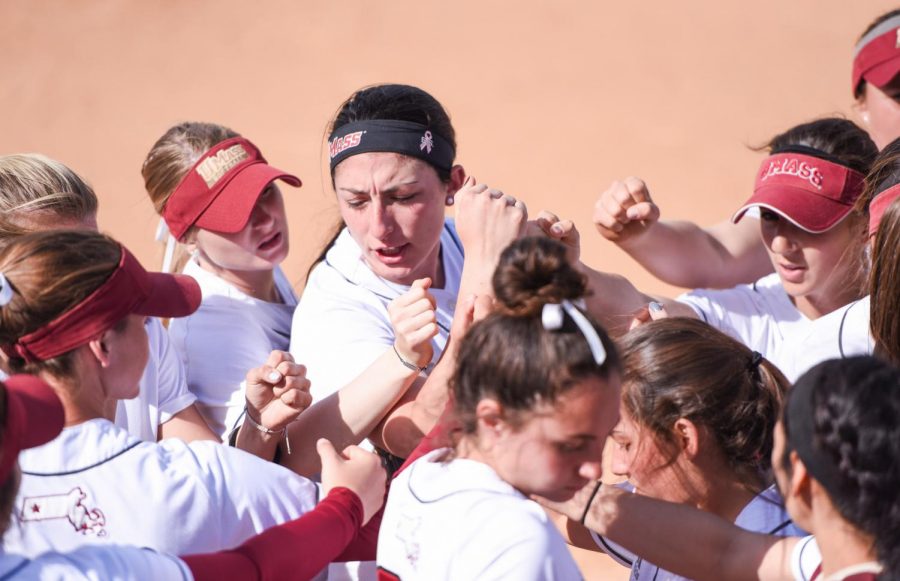
The grassy strip beyond Sortino Field’s perimeter has become a graveyard of batting practice meatballs and hanging curveballs; a museum for Cozza’s moonshots.
And not even her own teammates are safe.
In the lead up to the George Washington series in late March, the Minutewomen are outside and going live—scrimmaging, basically—taking advantage of the first real warm day of the season.
UMass splits into three teams—one group of five or six hits, while the other two combine to play the field, with the team’s three pitchers rotating in accordingly.
Freshman hurler Kiara Oliver goes up 1-2 on Cozza, and delivers a dropball down-and-in to try and jam her. It’s a pretty good pitch, but it doesn’t matter—Cozza hammers it anyway. She opens her hips and turns on it, blasting it over the scoreboard in left and into the grass outside the complex.
Carbone, standing in left, takes just a step or two toward the wall before the futility sets in.
Oliver’s new to that feeling, while Colleran’s had her fair share of Cozza-dealt humblings over the years. Colleran’s been throwing live against her since freshman year, and she’s had to face her more times than she’d like.
“Oh, way too much. I hate it,” Colleran says with a laugh. “I hate it. It’s terrible.”
Two weeks after Cozza took Oliver deep, it’s Colleran’s turn to try and get her out. The pitch call is a screwball, and Colleran has second thoughts.
“I looked and thought, ‘Eh, maybe a screwball’s not the best pitch to throw to her,’” Colleran said.
Colleran decided to throw it anyway—Colleran decided wrong.
“As soon as I released it, I saw her start to swing, and it was like yeah, no, over the scoreboard. Whatever. It happens.”
But therein lies another added value of Cozza’s dominance at the plate: She makes her pitchers better, because once UMass gets into conference, they’ll never face a better hitter than they do in practice.
“I definitely think she makes us better,” says Colleran. “There is not a better hitter in our conference, and I will say that with confidence. Throwing against her, if you can get her out, even if it’s only every once in a while, you can get anyone else out, because no one’s better than her.”
“Hundred percent, it does [make them better],” Stefanoni says. “It’s a challenge. Try and throw, and try and get her out. I know she makes our pitching staff better just by facing them.”
Colleran says she’d “rather it be Cozza” than someone else; she punishes you for the smallest mistake, but every dropball that stays too high in the zone and gets hammered into oblivion is a learning experience.
No one in the A-10 is more dangerous than Jena Cozza. No one knows that better than Meg Colleran and the UMass pitching staff.
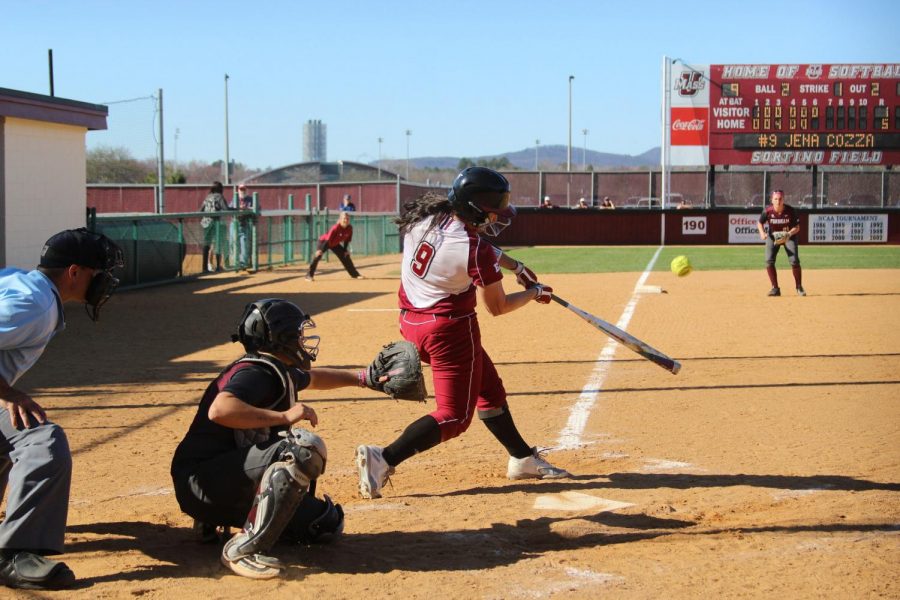
So now comes the final run, everything Cozza has been working for since she arrived as a silent but talented second baseman. The goal has always been the same—an A-10 championship—and she inched closer over the weekend.
Coming up against the best A-10 pitching rotation outside of Amherst, Cozza went 5-for-7 against Fordham with three homers, five RBIs and five walks—and, of course, a hit-by-pitch—to help deliver the program’s first A-10 regular season championship since 2012, the first since Stefanoni took over as head coach.
But that’s only step one. The A-10 tournament is just under two weeks away, and the Minutewomen already have the top seed locked up, going 19-0 in conference with one series remaining. For UMass—and for Cozza and Colleran especially—it’s tournament champs or bust, with ending Fordham’s five-year win streak the only goal.
Cozza’s departure will be a sad one for the Minutewomen, both on the stat sheet and in the locker room. She and Colleran like to joke with their younger teammates about their impending graduation, just to get them riled up a little bit. Real life is approaching and that’s setting in.
“[Colleran] even had an interview today,” Cozza mentions. “That’s another reality thing, we’re going to have jobs now. It’s weird.”
“I’m going to miss her dearly, not just for her softball abilities but just because I genuinely enjoy being around Jena Cozza,” Stefanoni says. “She’s been a very fun player to coach from the ground up, and that’s why I love what I do, when I get players like that and you can just enjoy seeing how far they’ve come, and let them go and do their thing. That’s Jena.”
The senior songs are picked, the Senior Day ceremonies are scheduled, and the conference tournament is looming. The Minutewomen are the favorites, but they have no delusions that it’ll be easy. They have the confidence of having swept Fordham on the road over the weekend, but the Rams are still dangerous, and UMass still has to beat them on their home field to unseat them from the top of the conference.
Several tennis courts lie behind Bahoshy Field’s left-field fence, where the Minutewomen will chase an A-10 title next weekend. Only time will tell whether or not teams will pitch to Cozza in the A-10 tournament; if they do, anyone on those courts better have their head on a swivel.
Amin Touri can be reached at [email protected], and followed on Twitter @Amin_Touri.
